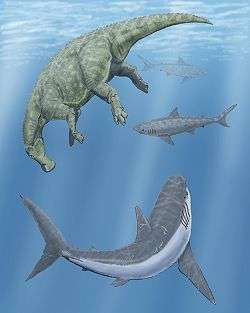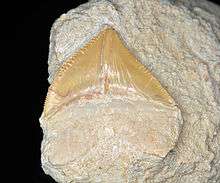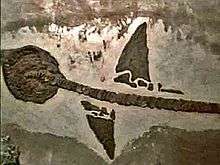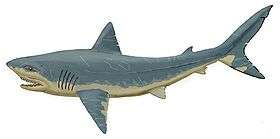Squalicorax
| Squalicorax Temporal range: Late Cretaceous | |
|---|---|
 | |
| Two Squalicorax and a Cretoxyrhina circling around a dead Claosaurus | |
| Scientific classification | |
| Kingdom: | Animalia |
| Phylum: | Chordata |
| Class: | Chondrichthyes |
| Order: | Lamniformes |
| Family: | †Anacoracidae Cappetta,1987 |
| Genus: | †Squalicorax |
| Species | |
|
See text. | |
Squalicorax is a genus of extinct lamniform shark known to have lived during the Cretaceous period.
Etymology
The name Squalicorax is derived from the Latin squalus for shark and the Greek κόραξ, "korax" for raven.
Description
These sharks are of medium size, up to 5 meters (usually around 2 meters) in length. The body were similar to the modern gray sharks, but the shape of the teeth is strikingly similar to that of a tiger shark. The teeth are numerous, relatively small, with a curved crown and serrated, up to 2.5 – 3 cm in height (the only representative of the Mesozoic Lamniformes with serrated teeth). Large numbers of fossil teeth have been found in Europe, North Africa, and North America.
Squalicorax was a coastal predator, but also scavenged as evidenced by a Squalicorax tooth found embedded in the metatarsal (foot) bone of a terrestrial hadrosaurid dinosaur that most likely died on land and ended up in the water.[1] Other food sources included turtles, mosasaurs, ichthyodectes and other bony fishes and sea creatures.
Description of selected species




The following are the best studied American species for which relatively complete skeletons are described:
- Squalicorax falcatus (Agassiz, 1843) – is a medium-sized shark with a broad snout and relatively small teeth. Length reached almost 3 meters. It lived during the Cenomanian to early Santonian (Campanian). Complete skeletons are known from sediments of the Western Inland Sea of the Cretaceous in Kansas, South Dakota and Wyoming, all in the USA. The teeth are also found in France, the Czech Republic, Canada and Morocco. Given the small teeth, this species is considered a hunter of small prey. However, teeth marks on the bones of marine reptiles is evidence that these shark also fed on carrion. The body shape and structure of the trunk placoid scales indicate the ability to swim quickly. A fully articulated (fully formed) 1.9 m long fossil skeleton of Squalicorax falcatus has been found in Kansas; evidence of its presence in the Western Interior Seaway.
- Squalicorax kaupi (Agassiz, 1843) - from the late Santonian to the late Maastrichtian of North America, New Zealand, Japan, Africa, Europe, Kazakhstan, Jordan and other places. Slightly larger than the preceding species, of which it was probably an ancestor.
- Squalicorax pristodontus (Agassiz, 1843) is the largest species, more than 3 – 5 meters long. From the size of its largest known teeth, it can be estimated that Squalicorax pristodontus grew to 5 m (16.5 ft) in length. It lived during the late Campanian to early Maastrichtian of North America, France, Netherlands, Egypt, Morocco and Madagascar. The relatively complete remains (vertebrae and fragments of jaws) have been found in marine sediments in North America. It is the species with the largest teeth, these teeth being loosely spaced and relatively very large in comparison with other species. In this genus of sharks studies have shown no precise correlation between the size of the teeth and the length of the body. They could eat relatively large prey and carrion.
- Squalicorax volgensis - the oldest species of the genus, from the Early Cretaceous of the Volga – have been described by L. Glickman et al. in 1971. The teeth of this species had virtually no serration. They are known from the Albian to the Turonian Age in Eastern and Western Europe, as well as Texas. Teeth have also been found from the Albian in Angola, Australia as well as the Cenomanian and Santonian Ages in Egypt, Kazakhstan and Russia. Finding the teeth of these sharks in the Cenozoic sediments shows that this genus probably did survive the Cretaceous-Paleogene crisis.
The world's largest and most complete semi-articulated fossil of Squalicorax was found in 2014 in stores of the Canadian Fossil Discovery Centre in Morden, Manitoba, in Canada, where it is now displayed. It measures more than 3 metres in length.[2]
List of species
- Squalicorax africanus Cappetta, 1991
- Squalicorax appendiculatus Agassiz in Geinitz, 1839
- Squalicorax baharijensis Stromer 1927
- Squalicorax bassanii Gemmellaro, 1920
- Squalicorax bernardezi Guinot, Uunderwood, Cappetta & Ward, 2013
- Squalicorax coquandi Vullo, Cappetta & Neraudeau, 2007
- Squalicorax curvatus Williston, 1900
- Squalicorax falcatus Agassiz, 1843
- Squalicorax heterodon Reuss, 1845
- Squalicorax kaupi Agassiz, 1843
- Squalicorax kugleri Leriche, 1938
- Squalicorax lindstromi Davis, 1890
- Squalicorax primigenius Landemaine, 1991
- Squalicorax priscoserratus Siverson, Lindgren & Kelley, 2007
- Squalicorax pristodontus Agassiz, 1843
- Squalicorax sagisicus Glikman, 1980
- Squalicorax volgensis Glikman, 1971
- Squalicorax yangaensis Dartevelle & Casier, 1943
References
- ↑ David R. Schwimmer, J. D. Stewart and G. Dent Williams. Scavenging by Sharks of the Genus Squalicorax in the Late Cretaceous of North America. PALAIOS Vol. 12, No. 1 (Feb., 1997), pp. 71-83
- ↑ http://www.cbc.ca/news/canada/manitoba/crow-shark-fossil-believed-to-be-world-s-largest-found-in-manitoba-1.2725575
Sources
- H. Cappetta, Handbook of Paleoichthyology (Gustav Fischer, 1987)
External links
- Elasmo.com page on Squalicorax
- Cretoxyrhina mantelli - The Ginsu Shark and Squalicorax falcatus - The Crow Shark
- Squalicorax beim ReefQuest Centre for Shark Research
| Wikimedia Commons has media related to Squalicorax. |